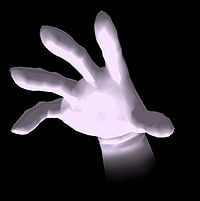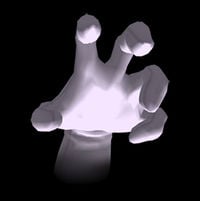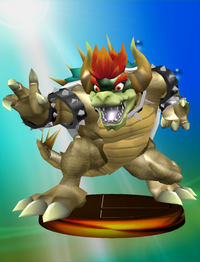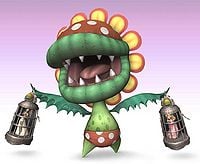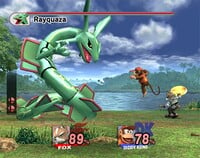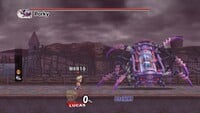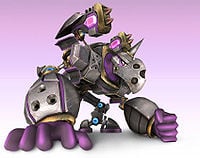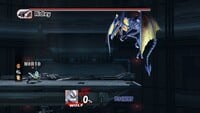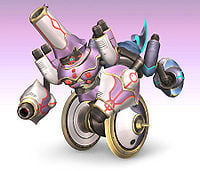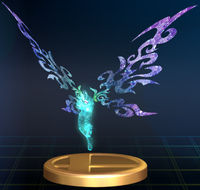Boss: Difference between revisions
Wolfy76700 (talk | contribs) |
Wolfy76700 (talk | contribs) No edit summary |
||
| Line 7: | Line 7: | ||
==Master Hand== | ==Master Hand== | ||
[[File: | [[File:MasterHandBrawl.jpg|right|thumb|Master Hand’s official art in ''Brawl'']] | ||
{{Main|Master Hand}} | {{Main|Master Hand}} | ||
The first “true” boss of the ''Smash Bros.'' series, '''Master Hand''' is the master of ceremonies for the ''Smash Bros.'' series. He is meant to represent the hand of a child playing with his toys and staging storyless fights between his favorite Nintendo characters (the playable characters in the game are, according to the intro movie, no more than dolls made to look like Nintendo characters). He could also represent a god because of how he brought the fighters to life and made the stages. He first appeared in the introduction to the first ''[[Super Smash Bros.]]'', bringing the characters shown in the intro to life. He then appeared at the end of the [[1P Game]] as the final boss. Going against usual Smash tradition, Master Hand has a certain amount of health that must be whittled down to 0%, as opposed to a percent that must be racked up, leading to a ring-out KO; this is due to Master Hand’s massive size, his ability to fly, and being unaffected by the knockback of attacks. Upon being defeated, Master Hand lets out a deep roar that resembles laughter, and flies off, writhing and exploding, into the distance. | The first “true” boss of the ''Smash Bros.'' series, '''Master Hand''' is the master of ceremonies for the ''Smash Bros.'' series. He is meant to represent the hand of a child playing with his toys and staging storyless fights between his favorite Nintendo characters (the playable characters in the game are, according to the intro movie, no more than dolls made to look like Nintendo characters). He could also represent a god because of how he brought the fighters to life and made the stages. He first appeared in the introduction to the first ''[[Super Smash Bros.]]'', bringing the characters shown in the intro to life. He then appeared at the end of the [[1P Game]] as the final boss. Going against usual Smash tradition, Master Hand has a certain amount of health that must be whittled down to 0%, as opposed to a percent that must be racked up, leading to a ring-out KO; this is due to Master Hand’s massive size, his ability to fly, and being unaffected by the knockback of attacks. Upon being defeated, Master Hand lets out a deep roar that resembles laughter, and flies off, writhing and exploding, into the distance. | ||
| Line 19: | Line 19: | ||
==Crazy Hand== | ==Crazy Hand== | ||
[[File: | [[File:CrazyHand.jpg|right|thumb|Crazy Hand’s official art in ''Brawl'']] | ||
{{Main|Crazy Hand}} | {{Main|Crazy Hand}} | ||
The strange, twisted brother of Master Hand, '''Crazy Hand''' is meant to represent the feeling of destroying one’s own creations, as opposed to Master Hand, who is meant to represent the opposite. He was introduced in ''Super Smash Bros. Melee'' as a secret boss who fights alongside Master Hand under specific conditions, namely that Classic Mode is cleared on Normal difficulty (or higher) in fewer than 18 minutes. (Crazy Hand will join Master Hand when Master Hand has half of his health left.) Crazy Hand also appears in Event 50, where he and Master Hand are fought on Final Destination with 300 health each. | The strange, twisted brother of Master Hand, '''Crazy Hand''' is meant to represent the feeling of destroying one’s own creations, as opposed to Master Hand, who is meant to represent the opposite. He was introduced in ''Super Smash Bros. Melee'' as a secret boss who fights alongside Master Hand under specific conditions, namely that Classic Mode is cleared on Normal difficulty (or higher) in fewer than 18 minutes. (Crazy Hand will join Master Hand when Master Hand has half of his health left.) Crazy Hand also appears in Event 50, where he and Master Hand are fought on Final Destination with 300 health each. | ||
| Line 29: | Line 29: | ||
==Master Core== | ==Master Core== | ||
[[File:Master Core Scorpion.png|right|thumb|Master Core in his Scorpion form, as he appears in ''Super Smash Bros. for Nintendo 3DS'']] | |||
{{recent release}} | {{recent release}} | ||
{{stub}} | {{stub}} | ||
{{Main|Master Core}} | {{Main|Master Core}} | ||
Revision as of 06:57, September 14, 2014
- Not to be confused with the smasher Boss.
A boss is a non-playable character that appears as a stronger-than-usual opponent in specific circumstances in one-player modes. Usually, bosses in the Super Smash Bros. series are both larger than playable characters and immune to knockback and flinching, meaning that instead of defeating them through a KO off the stage, they are defeated by reducing their HP to zero.
Fighting bosses is usually an entirely different matter than normal fights. While bosses will attempt to rack up the player's damage and knock them off the stage just as any other character, they have fewer attacks available, which tend to be telegraphed and so can be avoided more easily then in a normal battle; on the other hand, these attacks tend to deal high damage and knockback should they connect. Bosses' immunity to knockback also means that the player's moveset will have to be used differently - moves of high knockback but low damage are no longer as effective as those that deal high damage, while those that are quick with medium damage can be more effective overall should they be more safe to use.
Master Hand
The first “true” boss of the Smash Bros. series, Master Hand is the master of ceremonies for the Smash Bros. series. He is meant to represent the hand of a child playing with his toys and staging storyless fights between his favorite Nintendo characters (the playable characters in the game are, according to the intro movie, no more than dolls made to look like Nintendo characters). He could also represent a god because of how he brought the fighters to life and made the stages. He first appeared in the introduction to the first Super Smash Bros., bringing the characters shown in the intro to life. He then appeared at the end of the 1P Game as the final boss. Going against usual Smash tradition, Master Hand has a certain amount of health that must be whittled down to 0%, as opposed to a percent that must be racked up, leading to a ring-out KO; this is due to Master Hand’s massive size, his ability to fly, and being unaffected by the knockback of attacks. Upon being defeated, Master Hand lets out a deep roar that resembles laughter, and flies off, writhing and exploding, into the distance.
Master Hand reappeared in Super Smash Bros. Melee, reprising his role as the final boss in the 1-Player mode, now called Classic Mode. Master Hand is fought on Final Destination, which is very similar to his original stage, Master Hand's Residence. He fights essentially the same way as he did in the original game, but with a few new attacks. Upon being defeated, he leaves the stage in the same way that he did in the original game. He can also be fought in Event 50: Final Destination Match, where the player faces off against him and Crazy Hand at the same time. Master Hand is also a playable character via a certain glitch.
Master Hand also appears in the Game Boy Advance game, Kirby and the Amazing Mirror, in which he appears as a miniboss in multiple areas. Upon being defeated, Kirby can inhale him, like other minibosses, and gains the Smash ability, which is based on Kirby’s moveset in Melee. Master Hand, alongside Crazy Hand, also appears as the boss of the Candy Constellation. This is Crazy Hand’s only appearance in the game. The two, like in Melee, have attacks that they use in conjunction with each other. In this battle, neither can be inhaled; they both explode upon defeat.
Master Hand reappears in Brawl, once again as the boss of Classic Mode. He also appears in Boss Battles Mode as one of the game's ten bosses.
Crazy Hand
The strange, twisted brother of Master Hand, Crazy Hand is meant to represent the feeling of destroying one’s own creations, as opposed to Master Hand, who is meant to represent the opposite. He was introduced in Super Smash Bros. Melee as a secret boss who fights alongside Master Hand under specific conditions, namely that Classic Mode is cleared on Normal difficulty (or higher) in fewer than 18 minutes. (Crazy Hand will join Master Hand when Master Hand has half of his health left.) Crazy Hand also appears in Event 50, where he and Master Hand are fought on Final Destination with 300 health each.
When compared to Master Hand, Crazy Hand can be considered to be much more erratic (i.e. crazy). His idle pose is a strange, erratic movement, and he has multiple strange attacks that are unique to him. Many of his attacks also have side-effects, such as freezing and flowering. When Master Hand and Crazy Hand are fought together, they have several moves that they use in conjunction with each other, such as a high-powered clapping attack.
Crazy Hand has reappeared in Brawl, with new standards on how to fight him in Classic Mode. The player must beat Classic Mode on with a difficulty of Hard or higher in at 9 minutes or fewer. Master Hand and Crazy Hand will appear simultaneously at the beginning of the battle. Crazy Hand also appears as a boss separate from Master Hand in Brawl's "Boss Battles" mode.
Master Core
Giga Bowser
Giga Bowser (known as Giga Koopa in Japan) is the secret final boss of Adventure Mode in Melee. As his name suggests, he is a large, powered-up version of Bowser. Unlike other bosses, Giga Bowser is treated as a character - he has a damage percentage, takes knockback, has a full moveset, and can use items. With a manic expression, a darker, more malevolent color scheme, and a hulking size, Giga Bowser is surely a boss to be remembered.
Upon clearing Adventure Mode in fewer than 18 minutes on Normal difficulty (or higher), Bowser’s trophy, previously thrown into a mysterious abyss below Final Destination, rises back up onto the stage, and is struck by a strange lightning, transforming it into Giga Bowser. During the battle with Giga Bowser, a distorted version of the Final Destination theme that cannot be found in the Sound Test plays. Many of Giga Bowser’s attacks are powered up versions of Bowser’s. His down smash attack has a freezing effect, his forward smash has explosive properties, and his forward tilt has darkness effects. Unlike Bowser's, Giga Bowser's Fire Breath attack never diminishes.
Along with Mewtwo and Ganondorf, Giga Bowser appears in Event 51: The Showdown. The three team up against the player, who must defeat them to complete the event.
Giga Bowser also makes a semi-playable appearance in Brawl as Bowser's Final Smash, Giga Bowser. When used, Bowser temporarily transforms into Giga Bowser, who is essentially unchanged from Melee, keeping the elemental abilities of his attacks, as well as his massive size. Also, Giga Bowser does not flinch in Brawl. His down special, Giga Bowser Bomb, had a wind effect in Melee; this has been lost in Brawl.
Petey Piranha
Petey Piranha (known as Boss Pakkun in Japan) is the first revealed boss character in Brawl, and the first “true” boss to come from another series of games, as opposed to being unique to Smash. He appears as a boss in the Subspace Emissary, holding cages that contain Zelda and Peach. He uses both these cages, as well as his own abilities, to attack Kirby. The cage that Kirby attacks will break when Petey is defeated and explodes and the princess contained therein will be freed; The other princess is turned into a trophy, and subsequently taken, by Wario. Petey Piranha has previously appeared as a playable character in Mario Kart: Double Dash and a boss in Super Mario Sunshine.
Rayquaza
Rayquaza (known as Rekkuza in Japan) is the first Pokémon creature to be a boss in the Subspace Emissary. It first appears in the jungle after Diddy Kong goes to investigate a crashed Arwing. It comes out of the water and destroys the Arwing with an energy ball and then kidnaps Diddy. As it goes back in the water, Fox comes out and attacks the aggressive beast, causing it to lose its grip on Diddy Kong. The Pokémon attacks Fox with energy, but Fox reflects the attack back at the monstrous dragon, sending it tumbling back into the water. After this, Diddy Kong and Fox fight it. Its attacks are loosely based off the Pokémon games, and it has an exceedingly large amount of resistances.
Porky Minch
As one of the bosses of the Subspace Emissary and a high-ranked member of the Subspace Army, Porky Minch sends Primids to divert Lucas and sends in his giant statue, the Pig King Statue, which soon hunts Lucas down. This statue is indestructible, so Lucas has no choice but to run; the giant statue destroys giant containers, barrels, enemies and even metallic buildings. Lucas finally comes to a giant marsh which seems to save him—the statue sinks, but it soon respawns.
Lucas then stumbles, and just as the giant statue is about to crush him, someone uses a PK Thunder, which causes the statue to tip over, and Ness appears. The statue once again recovers and flies into the air, this time to crush Ness. However, he uses a PK Flash and the statue explodes, revealing Porky Minch himself inside (in his bed-mecha from Mother 3). A battle then ensues. He attacks by running around and by using a variety of lasers, but he is eventually taken down. Porky is brought back by Tabuu to distract the heroes in The Great Maze. He appears as an antagonist in EarthBound and Mother 3.
Galleom
Galleom is a large transforming robot found in the desert by Marth, Ike, and Meta Knight. Galleom's initial form is a large armored tank equipped with ramming spikes and missiles, but when confronted by the three swordsman, it transformed into an immense purple robot. In this form, he attacks with his large fists, missiles, and tries to crush the protagonists with his sheer bulk. The mechanoid is finally defeated, but not destroyed. He leaps off a cliff and falls through the ground into a tunnel system. There, he confronts Lucas and the Pokémon Trainer. After he is defeated a second time, he grabs the two companions and blasts into the sky, revealing a Subspace Bomb concealed in his head. Lucas uses PK Thunder to separate Galleom's arm from his body, releasing the two boys, who are then rescued by Meta Knight. Galleom is finally destroyed by the detonation of the Subspace Bomb. He is later brought back by Tabuu to confront the heroes yet again in The Great Maze.
Ridley/Meta Ridley
Ridley is the boss of the Subspace Emissary in Brawl who fights Samus and Pikachu after scratching Samus's power suit against the wall. Pikachu frees Samus with Thunder. The pair then fights Ridley, eventually defeating him.
Ridley reappears in his cybernetic form known as Meta Ridley and chases R.O.B., Olimar, Pikachu, Samus, Captain Falcon, Donkey Kong, and Diddy Kong in the Falcon Flyer,. Unlike other boss battles, there is a 2-minute time limit. They battle him atop the Flyer, defeating him and sending his body crashing back into the factory's vents, just as the whole island is destroyed.
Both Ridley forms are reincarnated by Tabuu as enemies in The Great Maze.
Duon
Duon is an immense, double-sided robot fought on the Battleship Halberd. Duon is created when Snake, Lucario, and Meta Knight destroy the Mr. Game & Watch clones that are maintaining the bridge. As aforementioned, Duon has two different sides: one is a bright blue and specializes at melee attacks and the other is pink and possesses long-range attacks. The blue side has two drill-like appendages and a large blade on its head. It can also fire explosive mines from its shoulders. The pink side can fire several energy blasts from its arm cannons in quick succession. It also fires three blue energy blasts from its head cannon and launches missiles from its shoulders. The beast can also leap into the air to try to crush the heroes and can spin around to cause damage. Upon its defeat, Duon melts into a puddle of shadow bugs and reveals the trophy of Mr. Game and Watch. Duon will attempt to stop the heroes again in The Great Maze.
Tabuu
Tabuu is the final boss of the Subspace Emissary in Super Smash Bros. Brawl. He has many devastating attacks, but most of them have a large amount of start-up lag. While playing in the Subspace Emissary, six characters are chosen to fight Tabuu.
Stage Bosses
Stage bosses are a type of boss introduced in SSB4. These bosses appear at certain times on some stages, hindering the battle until they are defeated. Yellow Devil on Wily's Castle is the only boss confirmed, appearing in both versions, however, Sakurai confirmed that others will appear. Additionally, when he confirmed stage bosses in the Smash Direct, Ridley's shadow was shown flying over the Pyrosphere, strongly implying him as a boss.
Note
When a boss's stamina is reduced to half, they will get stronger and attack in a different way. Examples include:
- Master Hand's gun will shoot 3 times. (If he is below 100% in Smash 64 and Melee)
- Petey Piranha will jump twice and swing cages more often.
- Duon will perform its dash attack twice.
- Ridley will perform his tail attack across the stage twice.
- Meta Ridley will perform a stomp that pushes the Falcon Flyer down below the lower blast line and launch a powerful fireball more often.
- Most of Rayquaza's attacks will be used three times in a row.
| Bosses | |
|---|---|
| Super Smash Bros. | Master Hand · Metal Mario · Giant Donkey Kong · Fighting Polygon Team |
| Melee | Master Hand · Crazy Hand · Giga Bowser · Fighting Wire Frames (Male · Female) |
| Brawl | Master Hand · Crazy Hand · Petey Piranha · Rayquaza · Porky · Galleom · Ridley · Duon · Meta Ridley · Tabuu · Fighting Alloy Team (Red · Blue · Yellow · Green) · False characters |
| Smash 4 | Master Hand · Crazy Hand · Master Core · Fighting Mii Team |
| Ultimate | Master Hand · Crazy Hand · Rathalos · Galleom · Giga Bowser · Galeem · Dharkon · Dracula · Ganon · Marx · Fighting Mii Team · False characters |
